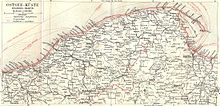Wiekowo (Darłowo)
| Wiekowo | ||
|---|---|---|

|
|
|
| Basic data | ||
| State : | Poland | |
| Voivodeship : | West Pomerania | |
| Powiat : | Sławno | |
| Gmina : | Darłowo | |
| Geographic location : | 54 ° 18 ' N , 16 ° 23' E | |
| Height : | 5 m npm | |
| Residents : | 480 | |
| Telephone code : | (+48) 94 | |
| License plate : | ZSL | |
| Economy and Transport | ||
| Rail route : | Stargard Szczeciński – Gdańsk | |
| Next international airport : |
Gdansk or Stettin-Goleniów |
|
Wiekowo ( German Alt Wieck ) is a village in the rural community (gmina wiejska) Darłowo ( Rügenwalde ) in the powiat Sławieński ( Schlawe ) of the Polish West Pomeranian Voivodeship .
Geographical location
The village is located in Western Pomerania , about 14 kilometers south of the Baltic city of Darłowo .
A side road leads to the village, which connects Pękanino ( Panknin ) on the national road 6 ( European route 28 ) Stettin - Danzig with Gleźnowo ( Steinort ) on the voivodship road 203 Koszalin ( Köslin ) - Darłowo - Ustka ( Stolpmünde ). Wiekowo is a station on the Stargard Szczeciński – Gdańsk railway line .
history

Old Wieck belonged to the Reformation in 1535 in Pomerania to the Monastery Buckow . Then it was transferred to the ducal office of Rügenwalde . Its history is closely linked to that of Wieck (now Polish: Wiekowice), through which it became the Eventin (Iwięcino) district in the Schlawe i. Pom. in the administrative district Köslin belonged. By belonging to Wieck, Alt Wieck was civilly connected to Abtshagen (Dobiesław).
With the expansion of the Stettin - Köslin railway to Schlawe in 1870, Alt Wieck received a great economic boost from the station built here. It became a loading station for the villages of Wieck (Wiekowice), Abtshagen , Neuenhagen Abtei (Jeżyczki), Pirbstow (Przystawy), Martinshagen (Grabowo), Panknin (Pękanino), Nemitz (Niemica), Göritz (Gorzyca), Kuhtz (Kusice), Klein - and Groß Soltikow (Sulechówko and Sulechowo) and Zitzmin (Sieciemin). On the days when the various cattle dealers took off, the farm wagons formed long lines. The livestock was loaded into the railway wagons destined for Stettin and Berlin . Other agricultural products also found their way to urban consumers via Alt Wieck.
Alt Wieck himself was able to call up all the major commercial operations in large numbers by 1945, as well as a gendarmerie station, a train station and a dental practice.
Towards the end of the Second World War , Alt Wieck was occupied by the Red Army on March 5, 1945 and then part of Poland.
church
Alt Wieck belonged to the Protestant parish Abtshagen until 1945 and was connected to the Abtshagen village church . The parish was located in the parish of Rügenwalde in the church province of Pomerania of the Church of the Old Prussian Union . The last German clergyman was Pastor Friedrich Jahn.
Even today, the former abbot as Dobiesław is the parish seat of the now Polish-Catholic Parafia. The Protestant residents are looked after by the parish office in Koszalin in the diocese of Pomerania-Greater Poland of the Polish Evangelical-Augsburg (i.e. Lutheran) Church.
school
The children from Alt Wieck and the housing estate at the train station attended school I in Wieck . The last headmaster before 1945 was teacher Gramzow.
literature
- Ludwig Wilhelm Brüggemann : Detailed description of the current state of the Königl. Prussian Duchy of Vor and Hinter Pomerania . Part II, Volume 2: Description of the court district of the Royal. State colleges in Cößlin belonging to the Eastern Pomeranian districts . Stettin 1784, pp. 861-862, paragraph (23).
- Manfred Vollack (Ed.): The Schlawe district. A Pomeranian homeland book. 2 volumes, Husum 1989.
